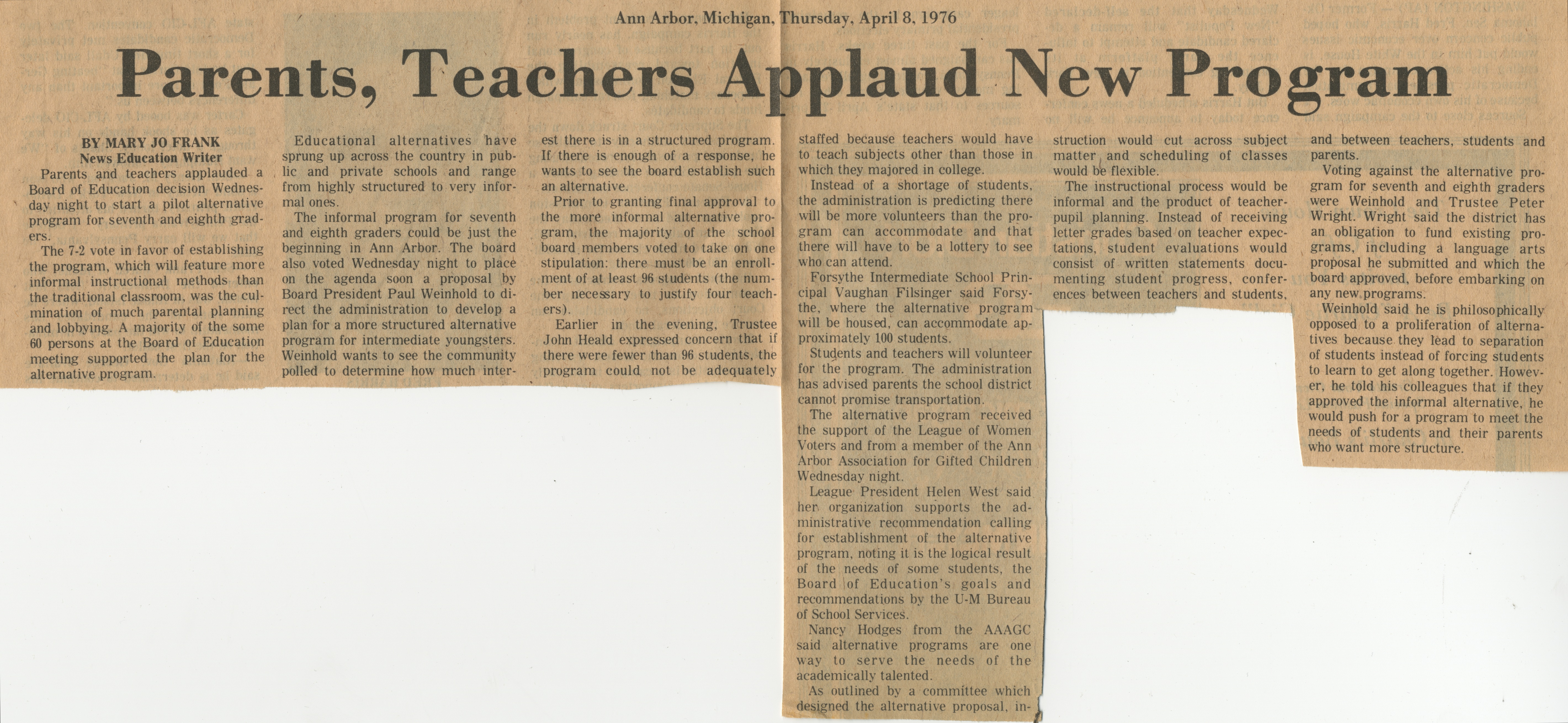Parents, Teachers Applaud New Program

Ann Arbor. Michigan. Thursday, April 8. 1976
Parents, Teachers Applaud New Program
BY MARY JO FRANK
News Education Writer
Parents and teachers applauded a Board of Education decision Wednesday night to start a pilot alternative program for seventh and eighth graders.
The 7-2 vote in favor of establishing the program, which will feature more informal instructional methods than the traditional classroom, was the culmination of much parental planning and lobbying. A majority of the some 60 persons at the Board of Education meeting supported the plan for the alternative program.
Educational alternatives have sprung up across the country in public and private schools and range from highly structured to very informal ones.
The informal program for seventh and eighth graders could be just the beginning in Ann Arbor. The board also voted Wednesday night to place on the agenda soon a proposal by Board President Paul Weinhold to direct the administration to develop a plan for a more structured alternative program for intermediate youngsters. Weinhold wants to see the community polled to determine how much interest there is in a structured program. If there is enough of a response, he wants to see the board establish such an alternative.
Prior to granting final approval to the more informal alternative program, the majority of the school board members voted to take on one stipulation: there must be an enrollment of at least 96 students (the number necessary to justify four teachers).
Earlier in the evening. Trustee John Heald expressed concern that if there were fewer than 96 students, the program could not be adequately staffed because teachers would have to teach subjects other than those in which they majored in college.
Instead of a shortage of students, the administration is predicting there will be more volunteers than the program can accommodate and that there will have to be a lottery to see who can attend.
Forsythe Intermediate School Principal Vaughan Filsinger said Forsythe, where the alternative program will be housed, can accommodate approximately 100 students.
Students and teachers will volunteer for the program. The administration has advised parents the school district cannot promise transportation.
The alternative program received the support of the League of Women Voters and from a member of the Ann Arbor Association for Gifted Children Wednesday night.
League President Helen West said her organization supports the administrative recommendation calling for establishment of the alternative program, noting it is the logical result of the needs of some students, the Board of Education's goals and recommendations by the U-M Bureau of School Services.
Nancy Hodges from the AAAGC said alternative programs are one way to serve the needs of the academically talented.
As outlined by a committee which designed the alternative proposal, instruction would cut across subject matter, and scheduling of classes would be flexible.
The instructional process would be informal and the product of teacher-pupil planning. Instead of receiving letter grades based on teacher expectations, student evaluations would consist of written statements documenting student progress, conferences between teachers and students, and between teachers, students and parents.
Voting against the alternative program for seventh and eighth graders were Weinhold and Trustee Peter Wright. Wright said the district has an obligation to fund existing programs, including a language arts proposal he submitted and which the board approved, before embarking on any new programs.
Weinhold said he is philosophically opposed to a proliferation of alternatives because they lead to separation of students instead of forcing students to learn to get along together. However, he told his colleagues that if they approved the informal alternative, he would push for a program to meet the needs of students and their parents who want more structure.
Article
Subjects
Mary Jo Frank
Middle Years Alternative Program (MYA)
Education
Ann Arbor Public Schools - Curriculum
Ann Arbor Public Schools
Ann Arbor Board of Education
Ann Arbor Association for Gifted Children (AAAGC)
Alternative Education
Ann Arbor League of Women Voters [LWV]
Old News
Ann Arbor News
Vaughan Filsinger
Peter Wright
Paul Weinhold
Nancy Hodges
John Heald
Helen West